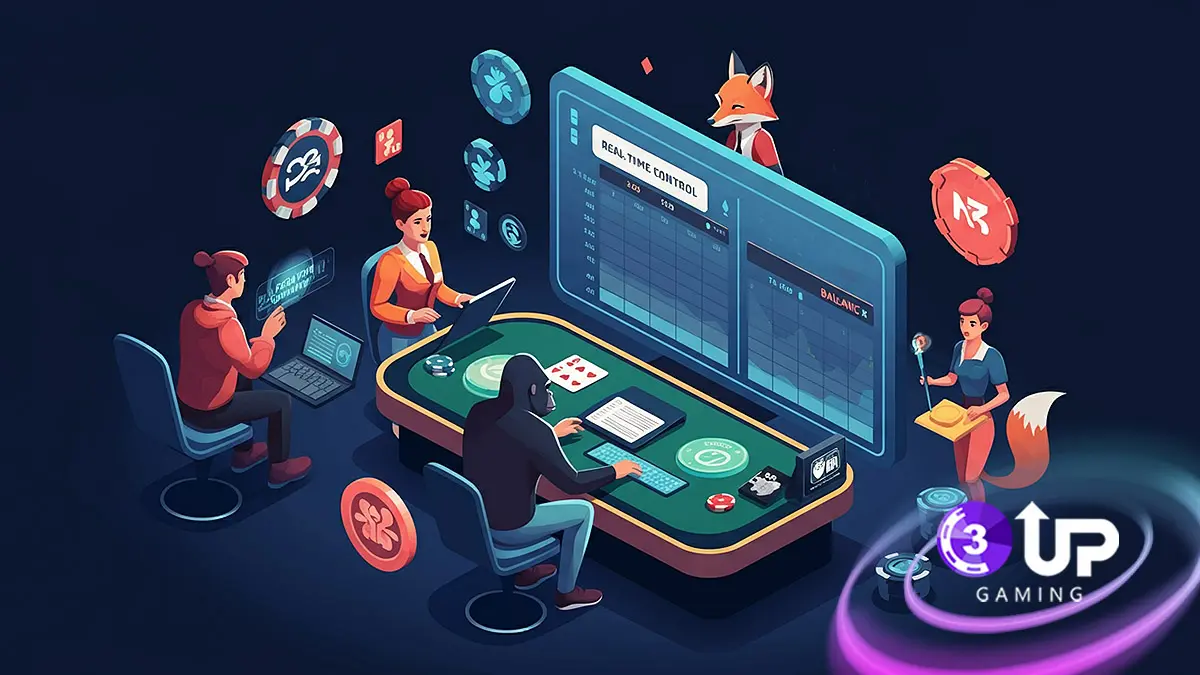Poker Tournament Software: Run Seamless, Scalable & Profitable Events Online! With rising tournament-play real money, online operators are pressured to provide smooth, scalable, and secure player experiences. The gist is that one has to invest in poker tournament software made for high-performance environments.
Unlike basic poker sites, a poker tournament platform is designed to manage mass registrations, balance tables in real-time, and allow for high-stakes gameplay with utmost precision.
It represents one of the most important facets of larger online poker software ecosystems, contributing to everything from user experience to compliance to payment integrations.
This guide will show you how to run smooth tournaments with the help of the proper technology. You’ll learn what the must-have features are of modern tournament software, how to scale for thousands of concurrent players, monetization strategies to maximize revenue, and tools to ensure fairness and security.
Now, let’s go ahead and learn what makes for a successful poker platform.
Poker Tournament Software: Run Seamless, Scalable & Profitable Events Online!
Poker tournament software is the ultimate solution for hosting professional and engaging poker tournaments on digital platforms. Designed for operators, casinos, and gaming startups, this software automates essential tasks such as player registration, blind level progression, chip distribution, table balancing, and real-time leaderboard updates. With secure backend controls and intuitive interfaces, it ensures smooth, fair, and uninterrupted tournament experiences for players worldwide.
Whether you’re launching small-scale daily events or large multi-table tournaments, the right poker tournament software allows you to scale effortlessly while maximizing profitability. With features like customizable structures, multi-device support, anti-fraud systems, and integrated payment gateways, you can attract more players, retain loyal users, and grow your brand in the competitive online poker market.
Key Features of Advanced Poker Tournament Software

The first poker tournament software is one that combines smooth gameplay experience, administrative ease, and fairness in large scales. From managing thousands of players to putting the finishing touches on tournament rules, here is what separates platforms:
Multi-Table and Player Mass Management
Modern systems handle multi-table tournaments with ease, as they provide tools that can auto-balance, reseat players, and handle the late registrations so that smooth gameplay is experienced.
And it’s perceived to be fair even during peak hours for daily activities and for large online events. AIS Technolabs, among others, use a dynamic table-balancing logic so that no advantage can be gained unfairly.
Customizable Structures and Buy-ins
From freerolls to high-stakes contests, a custom poker software allows you to customize every setting of the game-from blind levels, payout tiers, re-entries, etc.
Depending on the target demographic, operators may choose to fix buy-ins or conduct limited-time events for local markets or festivals. This contributes to creating unique value for the product amidst cutthroat competition.
Real-Time Analytics & Admin Dashboard
A scalable poker software lets you configure real-time dashboards that display player metrics, paradigm ROI, average time-on-table, and user behavior. Not only does this immensely assist you in making a decision but also in improving your operational efficiencies.
Fortified with admin controls, you may change tournament settings on the fly while simultaneously monitoring performance on the backend and user engagement.
Together, these features together go to make seamless, fair, and high-performance poker events designed for today’s fast-moving digital landscape.
Benefits of Hosting Tournaments with Custom Poker Software
Running tournaments on custom poker software offers operators a competitive edge that white-label solutions seldom provide.
Brand Differentiation & User Experience (UX) Control
Custom platforms allow you to create unique player experiences-from UI themes to gameplay features-that enhance the brand identity and keep players engaged for longer.
Fast Feature Iteration
Need new payout structures or leaderboard tweaks? Custom systems allow your processes to be developed rapidly.
You can launch updates faster, keeping your platform fresh and ahead of competitors. PokerBaazi’s 2025 upgrade is one such example, where new formats and player engagement tools were introduced well before anyone else.
Local-Market Compliance
The full-on control of the backend facilitates adapting the same to local compliance rules. From geofencing, language settings, and KYC flows-custom-made platforms do localization with ease.
Cost Efficient As Time Goes On
An upfront investment is greater; however, it negates sharing your revenues with the platform providers as time goes on. This means more profits from every tournament hosted, especially when the number of participants goes up. Hence, they are, in the end, better for hosting poker tournaments.
How to Set Up an Online Poker Tournament Platform
It takes careful planning and the right technology to launch a poker tournament platform. Here’s how to begin:
Opt for White-Label instead of Build-From-Scratch
You must first decide whether to create your own platform from scratch or use a white label poker solution.
- A white-label solution (provided by the likes of Mobzway Technologies and Gamio Technologies) is faster to deploy and has lower upfront costs. Therefore, if you want a short time-to-market and less technical/base responsibility, this is the way to go.
- Building from scratch requires more capital expense (CAPEX), however, it allows you full freedom on functionality and design. It’s a good option for enterprises that are in the long run and do have tech people to support them.
- Keep your operational expenditure (OPEX) in mind as well. Depending on the model selected, there are significant differences.
Want more? Read White Label Poker Software: Your Brand, Our Platform!
Checklist for Core Tech Stack and Licensing
Building a strong backend and taking care of compliance issues are essential to maintaining the legality and functionality of your platform.
- Servers: Select cloud servers with fast speeds and the capacity to accommodate tournaments with multiple tables.
- RNG Certification: An RNG certified random number generator has to be implemented to ensure the cards are dealt fairly. The use of RNG certification is a must for trust.
- Licensing: Opt for a jurisdiction (Malta, Curaçao, Isle of Man) and get gaming licenses that permit online poker activities.
Launch Playbook
Once the platform is set up, the launch can be planned in three phases:
- Internal Testing: Put the building through a stress-test for bugs and performance based on load.
- Soft Launch: An initial small group performs playing and giving feedback.
- Marketing Push: Time to announce your platform with ads targeted through social media and influencer partnerships.
Tools of Choice for Running Large-Scale Poker Events

Running large-scale poker events is not a question of having tables, it’s about giving players and operators a seamless experience. Poker tournament tools help automate operations, simplify workload, and engage players.
Most important tools are:
- Lobby Dashboards: Information hubs that display live games, players, prize pools, and registration in real-time.
- Late Registration Queues & Waitlists: These allow players to queue into ongoing tournaments or put holds when there is space available to keep the game full and alive.
- Auto-Payout Systems: Winnings are automatically paid directly into wallets after a tournament finishes with no human intervention, preventing errors and support strain.
- Customer Support Consoles: Dedicated admin consoles for managing controversy, player management, and real-time monitoring of activity on active events.
All of these factors together allow for scalable solutions for poker events, allowing sites to handle thousands of players with operations still being seamless.
They also improve poker event management by reducing human error involvement and increasing player satisfaction, two factors that directly relate to long-term retention and profitability.
Why Scalable Software Matters for Poker Tournaments
Without the proper infrastructure, this equals lag, server crash, and frustrated players. To prevent this, large operators employ elastic cloud hosting or cluster-node scaling, which provides the system flexibility to scale resources in real-time based on demand.
This is simply a matter of seamless gameplay even when fully utilized.
Seamless Performance Starts with Scalable Software
Downtime is not just annoying, it’s costly. Your customers can decide to make your business off your website for good, and you miss out on pay-for-entree. In an example, AIS Technolabs built a multi-table application that processed thousands of simultaneous users without a slowdown, boosting retention by 40% on weekend tournaments.
A successful poker tournament platform site will have to be able to:
- Instant table rebalancing
- Quick hand dealing
- Real-time updating across all devices
All of this enables you to run seamless tournaments and host well-polished events no matter the event size. From weekly freeroll to high-stakes championship, scalable software assists in keeping your poker room competitive and operational smoothly.
Monetization Opportunities in Online Poker Tournament Platforms

Running poker tournaments online is not just a matter of the game, but also a carefully thought-out approach to business. If one sets out the right model, a poker site can earn good sums of money and ensure player satisfaction.
Major Income Sources
Profitable poker tournament platforms employ:
- Rake: Minimal salary deduction from each entry or prize money.
- Entry Fees: Set payments by players to compete in events.
- Rebuys and Add-ons: Player choices to re-buy into a tournament or supplement their chip stack.
These are poker site monetization basics and apply to all levels of players.
Secondary Streams & Creative Add-ons
New platforms are also looking at in-app purchases and offerings such as:
- Personal avatars, emojis, or VIP passes
- Subscription premium tournaments
- On-platform advertising or sponsor banners
- Collectibles or NFTs related to events (used by platforms like Yudiz)
They generate extra revenues without dulling the game. Along with this, top poker tournament platforms generally launch special tournament bundles or sponsorships, generating another source of revenue while keeping the players engaged.
Meeting Players’ Budgets
Most of the operators today use dynamic pricing systems for attracting recreational players and rollers. While VIP tournaments will certainly be appealing to experienced players, low-buy-in add-ons will most certainly be appealing to new players.
Smart Pricing and Creative Promotion
While charging fees or capitalizing on in-app purchases, it is necessary to be compliant with the gaming laws, particularly where real money is being handled.
Done tastefully, poker tournaments can not only entertain players but also drive actual business expansion. Paired with smart pricing and creative, thrilling promotions, you can offer experiences that have your players returning again and again, and make your site more profitable.
Security and Fair Play in Tournaments
To survive in the long run, any poker room should also carry a factor of trust so that players can play peacefully. Proper secure poker software and effective anti-cheating solutions are no longer luxuries but necessities.
Anti-Collusion AI & RNG Certification
RNG certification ensures fair play. That ensures random shuffling of cards and no prejudice. Fairness is more than card shuffling.
There are anti-collusion AI in the available platforms to identify suspicious play. The platforms monitor play to report:
- Player collusion patterns
- Unusual fold-call-raise patterns
- Pattern chip dump activity
These systems function to stop cheating players from affecting the outcome of tournaments before they go out of control. LinkedIn threads and Reddit forums often debate their growing significance in high-stakes gaming.
Data Encryption & Anti-Fraud
Security also implies protecting the user data. That is where strong encryption and regulatory controls step in:
- KYC/AML verification: Authenticates identity and inhibits money laundering
- SSL encryption: Securely keeps all game data from outside intrusions
- IP logging and login notifications: Offers an additional fraud protection layer
Checklist of Best Practices
These should be enacted by operators:
- RNG software verified
- Behavior-monitoring systems
- Payment and login processes secured
- Third-party audits conducted regularly
properly implemented, poker tournament software security is a selling point, not a feature.
Payment Integration with Players’ Wallets & Payment Processing

Easy and safe payments are the things that help keep players in a good mindset and keep them on your site. Dynamic wallet systems and poker software with player wallet integration are therefore the pillars that support any profitable poker website.
Player wallet integration in top-of-the-line poker software supports different payments:
- Credit/debit cards
- E-wallet transfers like PayPal or Skrill
- Cryptocurrencies like Bitcoin and USDT
Instant payments promote player confidence, and batch payments minimize fees during traffic jams. Any platform must be capable of performing both, based on player and operator needs.
Smart API & Security Considerations
In order to make this possible, APIs must exchange information with third-party solutions regularly. Some recommendations follow:
- PCI DSS compliance: Facilitates secure card data processing
- Located currency support: Enables platforms to target local markets
- Fraud alerts automated: Guarantees player money and reputation safeguarding
With the right system, poker wallet systems not only facilitate transactions, but assist the overall user experience.
White Label Solutions for Tournament Hosting
White label poker solution offers you the convenience, affordable, and fast way of opening your tournament site. They’re pre-loaded with everything you would ever require, game engine, admin control panel, payment processing, and even license protection in some cases.
Why White Label?
- Rapid deployment: Live in weeks, not months
- Licensing sorted for you: Steer clear of messy legal process in regulated regions
- 24/7 technical support: Suppliers handle all back-end issues
The model is perfect for new players or companies to pilot new markets. It’s not perfect for everyone, however, though.
Restrictions to Remember
- Revenue share: You’re paying a percentage of your revenue to the provider
- Limited choice: You may not have complete control over updates or features
- Limitations of scalability: Not necessarily suitable for large events or flagship events
What you do with white label poker solutions as opposed to having it custom built depends on what you are aiming to achieve, how much you can spend, and where you see yourself in the future.
Upcoming Online Poker Tournaments Software Trends (2025-2030)
The online poker tournament marketplace is evolving at lightning speed, and operators must stay ahead. Web-savvy, the coming years will bear seismic shifts in tournament play and management.
AI, Blockchain & Beyond
Personalization through AI: Operators are using AI to personalize game recommendations, table seating, and even personal support. This drives engagement and retention.
- Blockchain for Transparency: Certain of the blockchain poker platforms are offering decentralized ledgers and hand histories which are audited. This instills confidence that the games are intact and genuine.
- VR/AR Tables: Virtual tables and augmented reality are being utilized by virtual poker rooms in order to make online play more realistic akin to sitting in a live table.
- Mobile-First Overhauls: With increasing mobile traffic, UX is being reimplemented from scratch for the smaller screen, to be faster, neater, and more intuitive.
How Operators Need to Get Ready
- Invest in modular software easily upgradeable to new technology
- Employ flexible vendors who will be capable of delivering future-proof enhancements
- Monitor regulatory changes on AI, blockchain, and crypto
By planning ahead, sites are able to avoid costly rebuilds and stay ahead in the rapidly changing field of AI poker software and high-stakes-in-consequence tournament play.
Wrap-Up: Poker Tournament Software
Successful online poker tournaments need more than a fantastic idea, they need the right tools, shape, and infrastructure. Adjustable formats and real-time reporting, secure payment processors and anti-cheating tools are just a few of the things that modern poker tournament software allows operators to deploy smooth, scalable and profitable tournaments.
Whether you’re planning small daily contests or flagship series with thousands of players, choosing the right platform ensures a smoother experience for both hosts and participants.
FAQ about Poker Tournament Software
1. What should I look for in poker tournament software?
Look for basic functionalities like a tournament lobby, auto-payouts, real-time analytics, and multi-table tournament support. Admin dashboards, player tracking, and scalable architecture are also essential for smooth operations and growth. See key features for a comprehensive perspective.
2. Can I have a customizable tournament format and buy-ins?
Yes. Most modern platforms provide adaptable tournament structures, i.e., blinds, re-entry, and pay-out schedules. This allows you to provide structures most comfortable for the bankroll and preference of your player base.
3. Can I run multi-table tournaments?
Yes, definitely. High-end sites have support for multi-table tournaments with auto-balancing, re-seating, and late registration. This allows large events to be set up and equitable.
4. How many players can participate in a tournament at one time?
Player throughput will depend on the scalability of the platform. Advanced systems handle hundreds or thousands of players simultaneously with cloud elastic configurations or cluster-node scalability for velocity.
5. What payout and entry fee payment gateways are supported?
Leading platforms accommodate a range of methods, credit/debit cards, e-wallet, cryptocurrency, and local currency. Some even offer instant payouts or batch settlements through secure APIs.
6. Is anti-cheating and security software integrated into the software?
Yes. Strong anti-cheating systems like behavior-pattern AI, RNG certification, and data encryption are the standard in decent quality solutions. KYC, AML, and secure sockets are some of the features that also ensure fair and secure gameplay.



